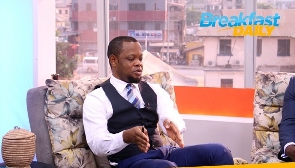 Private legal practitioner, Dr. Justice Srem Sai
Private legal practitioner, Dr. Justice Srem Sai
A private legal practitioner, Dr. Justice Srem Sai has stated that the President’s veto powers is not a blank cheque for him to use to settle political or personal scores.
This comes on the back of President Akufo-Addo rejecting the Criminal Offences Amendment Bill on Witchcraft, another one on Death Penalty and the Armed Forces Amendment Bill.
President Akufo-Addo indicated that the bills flout article 108 of the Constitution which bars Private Members Bills from imposing a charge on the Consolidated Fund (CF).
Commenting on the development in a tweet, Justice Srem Sai said if the President has any other concerns over a bill he would have to use other established mechanisms for enforcing the Constitution.
“REASON: The President’s veto power is exercisable only where he seeks a change or an amendment to “any SPECIFIC provisions of the bill”. This means that the President’s reasons for vetoing a bill is limited to the content of the bill.
“If the President has any other concerns over a bill, he (like any other citizen), would have to use other established mechanisms for enforcing the Constitution. The veto power, as I said, is not a blank cheque for him to use to settle political or personal scores,” Dr. Justice Srem Sai stated.
He continued: “In this case, however, the President is not seeking to change or amend any provision of the bill. His only reason for exercising the veto power is that the bill came from an MP (Hon. Francis Sosu) and not from him (President Akufo Addo).”
Below is the full statement by Justice Srem Sai
A law passed by Parliament (a bill) is not a full law (an Act) until the President signs it. This means that the President has the power to sign or to refuse to sign a bill. When he signs, we say he has given his assent; when refuses, he has vetoed it.
In August and in November this year, Parliament passed and presented some bills to the President to sign into Acts. Now, the President is claiming that he has vetoed the bills. The question is – is the President’s purported veto valid?
The beginning point of the answer to this question is that the President’s veto power is not a blank cheque – he can’t do as he wishes or behave as he pleases with the power. For his veto to be valid, he must act in accordance with the Constitution.
We know a few things: we know, for instance, that the President, in the exercise of the veto power, is limited (restricted) in at least 2 clear ways. He is limited in respect of TIME. He’s also limited in respect of the GROUNDS on which he may veto a bill.
TIME: Generally, he has up to 21 days (from the day the Speaker of Parliament presents the bill to him) to exercise the veto power. First, he has 7 days to “signify” to the Speaker that he has vetoed the bill; then, an additional 14 days to provide the grounds for the veto.
If the President defaults in satisfying any of these timelines – the 7 days, or the 14 days – the veto becomes invalid. In such a situation, he may be deemed to have assented to the bill notwithstanding that he has not actually signed it.
On the facts, one of the bills in question was presented to the President in August. The other 2 were presented to him in November. No one heard from him in respect of the memorandum until December 12. Now, do the maths. That’s not all.
REASON: The President’s veto power is exercisable only where he seeks a change or an amendment to “any SPECIFIC provisions of the bill”. This means that the President’s reasons for vetoing a bill is limited to the content of the bill.
If the President has any other concerns over a bill, he (like any other citizen), would have to use other established mechanisms for enforcing the Constitution. The veto power, as I said, is not a blank cheque for him to use to settle political or personal scores.
In this case, however, the President is not seeking to change or amend any provision of the bill. His only reason for exercising the veto power is that the bill came from an MP (Hon. Francis Sosu) and not from him (President Akufo Addo).